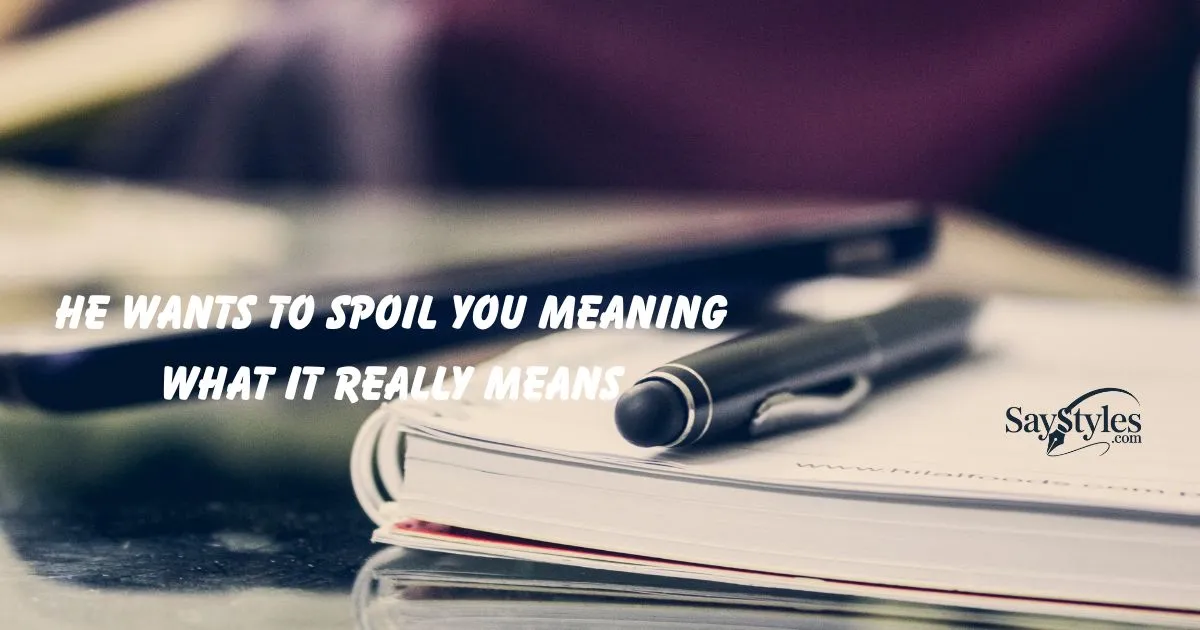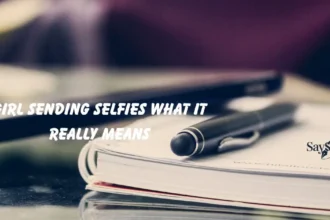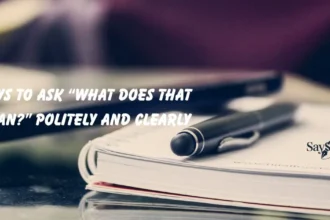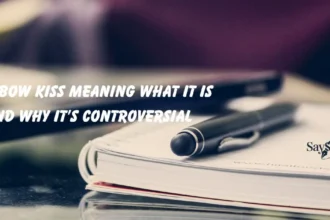In today’s world of texting and online communication, phrases like “He wants to spoil you meaning” can sound sweet, confusing, or even a little mysterious. Simply put, “he wants to spoil you” means he wants to make you feel special by giving gifts, attention, affection, or emotional care. It’s a modern way of expressing love, generosity, or romantic interest without directly saying “I like you.”
You’ll often see this phrase in social media captions, dating chats, or relationship talks, where people use it to show affection or status. But its meaning and intent can vary depending on context sometimes it’s genuine, other times it might hint at control or show-off behavior.
In this post, you’ll learn what “he wants to spoil you meaning” really means, how to spot its true intent, and how to respond naturally so you understand the emotion behind the words, not just the phrase itself.
What Does “He Wants to Spoil You” Mean?
When someone says “he wants to spoil you,” it usually means he wants to treat you with care, affection, and generosity—often through gifts, attention, or acts of love. It’s not always about money; sometimes, it’s about making you feel special and valued.
In real-world conversations, this phrase carries emotional warmth. It reflects someone’s desire to go above and beyond to make you happy.
Simple examples:
- “He brings you coffee every morning because he wants to spoil you.”
- “He plans surprise dates just to see you smile.”
- “When he says that, he probably means he enjoys giving you comfort and joy.”
In romantic contexts, this expression shows deep affection and effort. But remember—being “spoiled” doesn’t mean being materialistic; it’s often about emotional generosity and consistency.
See also: Rainbow Kiss Meaning What It Is and Why It’s Controversial
Best Alternatives to “He Wants to Spoil You”
Sometimes, you want to express the same feeling but in a different tone or setting—whether it’s casual texting, a social post, or a friendly chat. Here are categorized alternatives:
Casual & Playful Alternatives
Use these when chatting lightly or joking around with friends:
- “He’s totally obsessed with making you happy.”
- “He treats you like royalty.”
- “He can’t help but shower you with love.”
- “He’s all about those little gestures.”
- “He’s got you wrapped in care.”
- “He’s your biggest fan, for sure.”
- “He just loves pampering you.”
Romantic & Emotional Alternatives
Perfect for describing deep affection in relationships:
- “He adores spoiling you with affection.”
- “He finds joy in making you feel cherished.”
- “He’s head over heels for you.”
- “He loves seeing you smile.”
- “He spoils you out of pure love.”
- “He’s committed to making you feel special.”
- “You’re his soft spot.”
Flirty & Fun Alternatives
These sound cute and flirty—ideal for text banter:
- “He’s got that lover-boy energy.”
- “He’s your personal hype man.”
- “He can’t resist giving you attention.”
- “He’s always in ‘treat-you-right’ mode.”
- “He’s basically your biggest simp.”
- “He’s all about you, 24/7.”
- “He’s clearly trying to win your heart.”
Respectful & Mature Alternatives
Great for when you want to sound thoughtful or professional:
- “He values you deeply.”
- “He shows love through kindness.”
- “He invests in your happiness.”
- “He makes a genuine effort for you.”
- “He’s thoughtful and caring.”
- “He prioritizes your comfort.”
- “He demonstrates consistent appreciation.”
Humorous or Teasing Alternatives
These are light-hearted and good for friendly teasing:
- “He’s got a PhD in spoiling you.”
- “He’s the CEO of making you smile.”
- “He treats you like a limited-edition collectible.”
- “He’s basically your fairy godfather.”
- “He’s running a one-person fan club.”
- “He’s addicted to making you happy.”
- “He’s turning ‘spoiling you’ into a hobby.”
“He Wants to Spoil You” in Texting / Messaging
In texting culture, this phrase often appears as a flirty or caring message. It can express affection, admiration, or playful energy. Below are 20 texting examples with short explanations:
- “He said he wants to spoil you—girl, that’s a green flag!” (Friendly excitement)
- “He’s planning something for you again 👀” (Playful curiosity)
- “If he’s spoiling you, he’s definitely serious.” (Observation with intent)
- “He’s got big ‘treat-you-right’ energy.” (Modern slang use)
- “You’re lucky—he loves giving you his all.” (Warm compliment)
- “He’s the kind who’d bring snacks just because.” (Cute example)
- “He spoils you like you’re his world.” (Emotional tone)
- “When he says that, it means he’s invested.” (Interpretation)
- “He’s always doing something sweet—definitely wants to spoil you.”
- “If he texts you good morning daily, that’s his way of spoiling you.”
- “He’s not showing off, he’s just being caring.”
- “That’s his love language, for sure.”
- “He probably just wants you to feel secure.”
- “He’s giving main character treatment.”
- “Spoiling you is his soft spot.”
- “He doesn’t say much, but his actions scream it.”
- “He spoils you emotionally, not just materially.”
- “That’s not manipulation—it’s affection.”
- “When he sends random gifts, that’s how he expresses love.”
- “He’s not being over the top—he’s being intentional.”
These examples show how tone can shift—from romantic to casual, depending on context and relationship depth.
When to Use & When to Avoid “He Wants to Spoil You”
✅ When to Use
- When describing romantic gestures or sweet attention.
- In light-hearted conversations about relationships.
- When highlighting someone’s caring nature.
- In flirty or affectionate chats where tone feels natural.
- When you want to express that someone’s going the extra mile emotionally or materially.
🚫 When to Avoid
- In formal or professional settings—it can sound too personal.
- When it might imply material dependency or manipulation.
- If the person’s gestures make you uncomfortable—then it’s not affection, it’s pressure.
- Avoid using it sarcastically if the intent is genuine.
- Don’t use it if you’re unsure about their intentions—it can be misleading.
Pro tip: In real chats, tone matters. “He wants to spoil you” can sound sweet in a flirty text but awkward in a work group chat.
Key Insight About “He Wants to Spoil You” Meaning
1. What does “He wants to spoil you” mean?
When a man says “I want to spoil you,” it usually means he wants to treat you well, give you gifts, affection, or special attention, and make you feel appreciated.
2. Does “spoiling” always mean spending money?
Not necessarily. While it can mean buying gifts or taking you out, it can also mean emotional spoiling — giving you love, care, and quality time.
3. Is it always romantic when someone says they want to spoil you?
Most of the time, yes. It’s often said in a flirty or affectionate way, showing romantic interest or a desire to make you feel special.
4. Can “spoiling” be a bad thing?
Sometimes. If it turns into control or manipulation, or if someone uses gifts to gain power, that’s not healthy. True spoiling should come from care, not control.
5. What does it mean when someone says it online or in text?
In texting or on TikTok, “He wants to spoil you” often appears in romantic or lifestyle videos, suggesting a loving, generous, or ideal partner.
6. How should you respond when someone says they want to spoil you?
It depends on your comfort level. You can reply playfully (“Aww, that’s sweet!”) or seriously (“That’s nice of you, but I’m not into that”).
7. Is “spoiling” the same as being in love?
Not exactly. Spoiling can be a way to show love, but love involves deeper emotional connection, respect, and effort, not just gifts or attention.
Final Thoughts
When someone says “he wants to spoil you,” they’re usually highlighting affection, care, and effort—not just material generosity. The phrase fits best in romantic or playful settings, where love languages shine through gestures.
Use it wisely, understand the intent behind the words, and don’t hesitate to switch to more respectful or emotional alternatives when needed. Whether it’s “he cherishes you” or “he loves making you happy,” the message stays the same you’re valued and appreciated.

I’m Lily Hart, the Admin behind the engaging responses at SayStyles.com! With a knack for blending wit and warmth, I turn every piece of writing into something memorable. From clever advice to fun comebacks, I’m here to make sure every response leaves you smiling and thinking.






